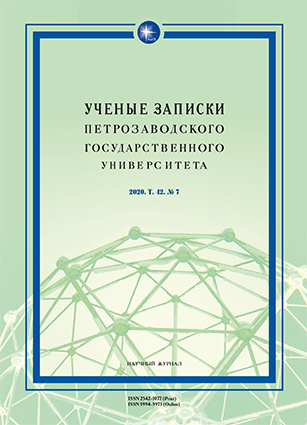О МЕХАНИЗМЕ ПЕРЕОСМЫСЛЕНИЯ РЕЛИГИОЗНЫХ КОНЦЕПТОВ
В ФИЛОСОФСКОМ ТЕРМИНООБРАЗОВАНИИ Н. Ф. ФЕДОРОВА
THE MECHANISM OF RETHINKING RELIGIOUS CONCEPTS
IN THE PHILOSOPHICAL TERM SYSTEM OF N. F. FEDOROV
Author(s): Natalia Vitalievna KozlovskayaSubject(s): Language and Literature Studies
Published by: Петрозаводский государственный университет
Keywords: philosophical term system; semantic term formation; syntactic term formation; transterminologization; cognitive term study; dynamic frame; mental picture; authorial philosophical term
Summary/Abstract: The article deals with the rethinking of the term “Pentecost” in Nikolai F. Fedorov’s philosophy interpreted in the context of modern cognitive terminology science. It has been shown that a theological term is a motivator of the semanticterm formation. The importance and relevance of the research is determined by the need to describe the mechanism of rethinking the terms used for the verbalization of religious concepts, which was one of the main tools of a Russian cosmist philosopher Nikolai F. Fedorov. In this study, the methods of cognitive analysis were for the fi rst time applied toFedorov’s transterminologization. In a philosophical text, the information that undergoes special cognitive pro cessingis verbalized: the elements of the initial frame are replaced with the new ones. Thus, the dove (“a symbol of love and harmony”) is transformed into the image of the “daughter of a man” which embodies the “replacement of death withresurrection”, while the “tongues of fi re” are substituted by the “regulator or lightning conductor”. The interaction betweendiff erent frame structures generates a cognitive metaphor of the “Pentecost as connection”. A new notion (Pentecost as the connection of people for the common cause of resurrection) transforms the semantic continuum of Christiansphere of concepts through creating a new kind of knowledge about God and a human and through forming a new ritual.The “metaphorical symbol” comprises a great number of semes based on associative criteria, which gives the author an opportunity to fi ll the notion “Pentecost” with heterogeneous and multifaceted semantic constituents: regulation,denunciation of discord, full age, “new Babylons” (new civilizations), the substitution of birth with resurrection, etc.Based on metaphorical rethinking, the authorial term “Pentecost” is included by its author into the next stage of termformation in philosophy which uses the syntactic method as a key mechanism. Fedorov’s Philosophy of the CommonCause is characterized by a distinctive feature which lies in simultaneous lexical explication of three concepts: theuniversal Christian concept of Pentecost, with its historical layer being represented in the New Testament; the natio nalcultural Orthodox concept (the Holy Trinity); and the authorial concept of Pentecost seen as the connection of peoplefor the common cause of resurrection, in the brotherhood of the cross and in language. Besides the traditional methods of contextual and concept analysis, the methods of corpus linguistics were employed for the research. The subcorpus of Fedorov’s collected works and the text analysis software tools of the Sketch Engine corpus manager were used forbuilding the concordance. Thesaurus corpus engine revealed the simultaneous functioning of two semantic complexes within the text: Pentecost as an Orthodox Christian festival and as the universal Resurrection.
Journal: Ученые записки Петрозаводского государственного университета
- Issue Year: 42/2020
- Issue No: 7
- Page Range: 17-24
- Page Count: 8
- Language: Russian

